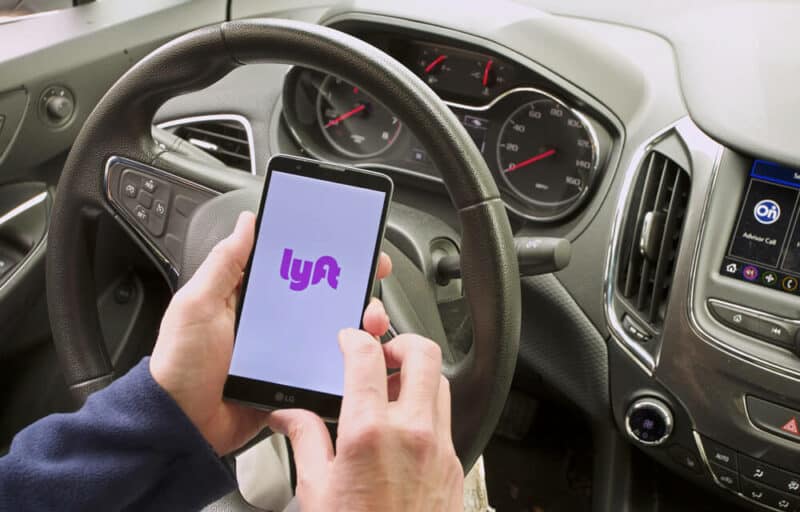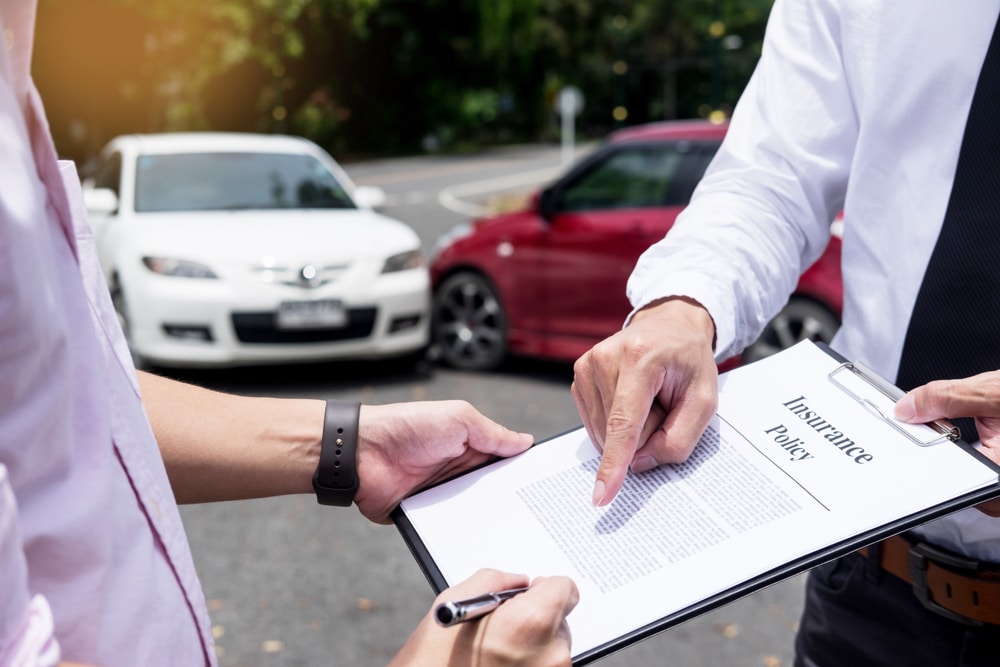Can You Sue Lyft for an Accident?

As attorneys who’ve amassed years of experience representing accident victims, Spaulding Injury Law is well-equipped to help you handle a Lyft accident. We are familiar with the tactics used by large corporations like Lyft and are committed to ensuring you receive maximum compensation for your injuries.
We’re available 24/7 to address any questions or concerns you might have regarding an accident with Lyft or Uber. So, if you’ve suffered a Lyft accident, don’t hesitate to reach out to us and start on the path to recovering your damages.
Call Spaulding Injury Law at (770) 874-9746 to schedule a free consultation.
Lyft Accident Settlements
Every Lyft driver is as likely as any other motorist to be involved in an accident. Consequently, injuries incurred in such accidents can result in staggering medical bills and may adversely affect every facet of your life.
The silver lining here is that if you were an innocent passenger in a Lyft vehicle at the time of the accident, you should not have to bear the cost of an incident you didn’t cause.
Both Uber and Lyft provide insurance coverage of up to $1 million, potentially accessible to you if you file a personal injury claim against them. However, the compensation you can expect from a Lyft accident settlement varies based on the specifics of your case.
Most personal injury settlements against Lyft range between $300,000 to $1 million. The amount you receive is typically proportional to the severity of your injuries and other case-specific factors.
How Much Have Others Received in Lyft Accident Settlements?
Since Lyft and Uber are private companies, they aren’t required to disclose all their operational data. As such, exact figures regarding the number of Lyft drivers on the road, the passengers they transport, the frequency of accidents, and the damages awarded to injured passengers and other road users in the State of Georgia are not readily available. However, we do have a few insights into Uber and Lyft settlements:
- Lyft and Uber have been linked to a 2-3% increase in motor vehicle accidents, according to academic researchers.
- As per a 2017 blog post by Uber’s co-founder Garrett Camp, Uber was providing approximately 15 million rides per day.
- In 2016, ten fatal accidents involving Uber drivers were reported.
- Personal injury settlements for cases involving Uber and Lyft car accidents have ranged from $500,000 to $1.25 million.
Every accident is unique. Determining the potential settlement or the worth of your case can be challenging until you’ve discussed the details with a seasoned Uber or Lyft car accident attorney.
The Extent of Injuries in a Lyft Accident
The severity of your injuries significantly impacts the compensation you may receive from Lyft’s insurance company. Spaulding Injury Law, together with Lyft’s insurance company, will take into account your lost wages, medical expenses, and the cost of your pain and suffering during settlement negotiations.
For example, if you were a Lyft passenger and suffered minor injuries like cuts and bruises and could resume work as usual, you might not receive a high compensation amount since the accident’s impact on your life was relatively minimal. Conversely, if you sustained a spinal cord injury resulting in an inability to work and necessitating extensive medical treatment and rehabilitation, you could be eligible to recover up to $1 million in compensation.
Common damages awarded in accidents involving Lyft and Uber encompass doctor visits, hospitalization, ambulance expenses, surgery, rehabilitation, physical therapy, medical equipment, prescription medication, vehicle repair or replacement, therapy for mental health issues like anxiety, depression, or PTSD, loss of income, and future lost wages, among others.
These damages can be broadly categorized into two types: economic and non-economic damages.
Economic Damages
These are the measurable, out-of-pocket expenses directly related to the accident. They include:
- Medical expenses: This involves the cost of immediate medical care, such as ambulance fees, emergency room visits, surgeries, hospitalization, and doctor visits. It also includes the cost of ongoing and future medical treatment, such as physical therapy, rehabilitation services, and the cost of any necessary medical equipment or prescription medications.
- Loss of income: If the victim is unable to work due to their injuries, they may be able to recover compensation for the wages they would have earned during that period.
- Future lost wages: If the victim’s ability to work in the future is compromised, either because of prolonged recovery or permanent disability, they can also claim compensation for future income loss.
- Property damage: This refers to the cost of repairing or replacing personal property damaged in the accident, most commonly the victim’s vehicle.
Non-Economic Damages
These are more subjective and harder to quantify but are nonetheless significant. They include:
- Pain and suffering: This is intended to compensate the victim for their physical pain, mental anguish, and decreased quality of life resulting from the accident.
- Emotional distress: Serious accidents can result in significant emotional trauma, leading to conditions like anxiety, depression, or post-traumatic stress disorder (PTSD). Therapy and counseling expenses to treat these conditions can be included in a claim.
- Loss of consortium: This refers to the negative impact the accident has had on the victim’s relationship with their spouse or family.
Punitive Damages
In cases where the defendant’s conduct was particularly reckless or egregious, the court might award punitive damages. These are designed to punish the wrongdoer and deter similar behavior in the future.
The Status of the Lyft/Uber Driver
Remember, Uber and Lyft drivers are not employees of the rideshare companies; they are considered independent contractors. This distinction is vital as it often influences the insurance coverage and potential liabilities in the event of an accident.
There are three main scenarios when it comes to the driver’s status at the time of the accident:
- The Lyft driver was not logged into the app: If the Lyft driver was not in driver mode when the accident occurred, Lyft’s insurance coverage would typically not apply. In this case, any claim would have to be directed toward the driver’s personal auto insurance policy.
- The Lyft driver was logged into the app but had not accepted a ride request: If the Lyft driver was in driver mode but hadn’t yet accepted a ride request, Lyft’s insurance coverage would be limited. It provides contingent liability coverage of up to $50,000 per person injured in an accident, up to a maximum of $100,000 per accident, and up to $25,000 for property damage per accident.
- The Lyft driver had accepted a ride request or was in transit with a passenger: If the Lyft driver was transporting a passenger or was en route to pick up a passenger when the accident occurred, Lyft’s $1 million liability policy should apply.
Hire a Lyft Accident Lawyer
When involved in a Lyft accident, enlist the help of an experienced Lyft accident attorney as early as possible. Spaulding Injury Law can assist with collecting evidence, communicating with insurance companies, and negotiating a fair settlement.
If you’re injured in a Lyft accident, Spaulding Injury Law is here to help. Our experienced lawyers can guide you through the claim process, handle the negotiations with insurance companies, and ensure you get the compensation you deserve.
Contact us today to schedule your free consultation.

When you become our client at Spaulding Injury Law, you’ll be represented by a thoroughly experienced Atlanta personal injury attorney like Theodore A. Spaulding. For over 15 years, Mr. Spaulding has helped victims of negligence across the state of Georgia resolve personal injury cases, and he’s received a remarkable number of awards and honors from the legal community recognizing his commitment to clients and to the metro-Atlanta area.
Mr. Spaulding has been named one of the Top 100 trial lawyers in Georgia by the National Trial Lawyers for six successive years.
He is honored as a lifetime member of the Million Dollar Advocates Forum ® by the Top Trial Lawyers in America ®.
Charter Member of the Distinguished Justice Advocates.
Member of the Atlanta Bar Association.




















